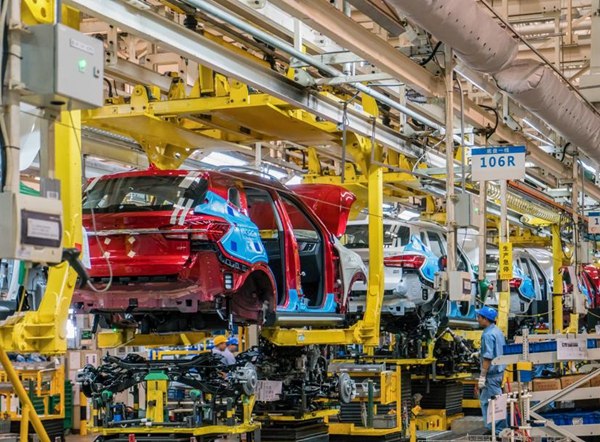SAIC Motor works to accelerate intelligent, digital manufacturing
SAIC Motor's Lin-gang factory is one of the first highly flexible manufacturing bases in China to achieve full integration of traditional and new energy vehicle production technologies. [Photo provided to chinadaily.com.cn]
SAIC Motor Passenger Vehicle is promoting the intelligent and digital manufacturing transformation within the automotive industry, with its Lin-gang factory being at the forefront of the drive.
Operational since 2008, SAIC Motor's Lin-gang factory is one of the first highly flexible manufacturing bases in China to achieve full integration of traditional and new energy vehicle production technologies.
With a total area exceeding 1.2 million square meters, it houses both vehicle and engine manufacturing facilities.
"As a core production base of SAIC's passenger vehicle, our Lin-gang factory has undertaken the manufacturing responsibilities for numerous flagship and bestselling models," said Chen Peifeng, director of the factory.
Through deep integration of industrial big data platforms, intelligent equipment, and core business scenarios, an efficient, practical, and precise intelligent manufacturing system has been established. "By leveraging digitalization, we have significantly improved work efficiency, reduced manual errors and costs, and lessened the workload for our analysis engineers," Chen added.
"Our Lin-gang factory can now produce 43 vehicles per hour, with a new product vehicle rolling off the assembly line almost every 70 seconds," according to Chen.
Real-time data monitoring, defect analysis and vehicle tracking have streamlined operations while improving efficiency. At the Lin-gang base, statistics show that single-vehicle energy consumption decreased by 3.8 percent, single-vehicle logistics costs dropped by 6 percent and potential inventory funds reduced by 2 percent.
Moreover, through the synergy of intelligent equipment and digital platforms, the base achieved a 2 percent increase in production start rates, a 5 units per hour boost in hourly outputs, and an overall efficiency enhancement exceeding 10 percent.
Underpinning this intelligent manufacturing transformation is SAIC Motor Passenger Vehicle's development of cutting-edge technology platforms empowered by SAIC Group's investments across three core technology paths — pure electric, hybrid and hydrogen fuel cell.
"These include three vehicle technology platforms — a pure electric dedicated serialized platform, an electromechanical integrated architecture and a hydrogen-dedicated architecture," explained Xu Lu, chief operating officer of SAIC's Innovation Research and Development Institute. "They also encompass four key system technology platforms covering batteries, electric drives, powertrains and intelligent vehicle solutions."
Among them, SAIC's electric dedicated serialized platform is the first of its kind in China and can be applied to multiple vehicle varieties and levels, including sports cars, SUVs and MPVs.
One example is the MG4 EV developed based on the electric dedicated serialized platform. This model became the first Chinese electric vehicle to achieve cumulative overseas sales exceeding 140,000 units, securing its position as the bestselling compact pure electric vehicle in Europe.
"NEVs represent the future direction of automotive transformation, which SAIC must adhere to," Xu said.
In 2023, Shanghai's automotive production volume reached 2.156 million vehicles, accounting for 4.8 percent of China's total. NEV production totaled 1.287 million, representing 13.4 percent of the national total, with a production value of 387.6 billion yuan ($53.5 billion), up 32.1 percent year-on-year.
-
Address No 200 Shengang Avenue, Pudong New Area, Shanghai, China
-
Zip Code 201306
-
TEL +86-21-68283063
-
FAX +86-21-68283000








